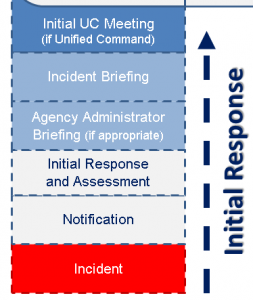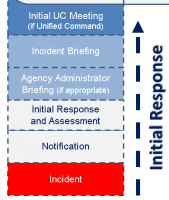Recognizing a critical ICS training shortfall, EMSI developed the ICS-220 Initial Response Team course, an advanced ICS training course greatly expanding on initial response management concepts, to better prepare response personnel for managing the often chaotic and dynamic initial stages of the response, with additional focus on a prolonged posture in this critical portion of an incident lifecycle. With the release of our enhanced ICS-220 – Initial Response course, EMSI has also published the Initial Response Guide Book, a comprehensive guide to ICS in the initial response phase. The guide book is available through IMT Gear.
Since every incident, large or small, has an initial response, we will simply refer to this application of ICS as Initial Response. This comprehensive Initial Response Guide Book provides guidance for using ICS on small-scale incidents and the Initial Response phase to evolving incidents. By small-scale incidents, we are referring to Type 4 (IPIECA Tier 1) and below incidents (routine and short duration). We define “Initial Response” as the initial response phase (stem of the Planning P) of an expanding incident that is of Type 3 (Tier 2) complexity and greater. A Type 3/Tier 2 incident is defined as:
• increasing in complexity,
• lasting at least several days, and
• requiring a written Incident Action Plan (IAP).

Given that approximately 95% of all incidents never leave what is often referred to as the stem of the Operational Planning Cycle ( or “P”), the standard NIMS All-Hazard ICS training curriculum is substantially deficient in addressing today’s complexities in preparing responders to effectively utilize ICS in the chaotic and dynamic initial response phase of an incident. While ICS-200 is a system course intended for single resources and initial action incidents, the concepts tend to be more foundational and less practical. The next level of system training, ICS-300, quickly jumps out of the initial response phase and focuses on “expanding incidents”, while placing a heavy emphasis on the proactive, managed phase of the incident, typically referred to as the cyclical part of the Planning “P”, for Type 3 (Tier 2) and beyond incidents.
Our new ICS-220 course and companion IR Guide Book are designed to address this gap. Our new ICS-220 course is now officially available in EMSI’s catalog of courses and our Initial Response Guide Book is available for use by any responder in the Initial Response phase, including Initial Response Incident Commanders and Initial Response IMT members.
Since inception in 2000, EMSI has played a major role in helping government and industry clients alike, prepare, train, and respond to emergencies of any cause or size. Comprised of national and international all-risk, all-hazard response experts, EMSI’s seasoned cadre gives us a unique background and perspective in dealing with incident and responder needs at every level of government and industry, to include the international community. As a global response leader in all-risk, all-hazard, multi-discipline incidents, EMSI has a proven track record in helping the myriad of local, state, national, international, and private sector entities with their incident management and emergency management programs.
EMSI is a service-disabled veteran owned, minority business enterprise (MBE) that supports a broad range of clients. To learn more about EMSI and how we can help your organization’s response preparedness, please visit www.emsics.com.


